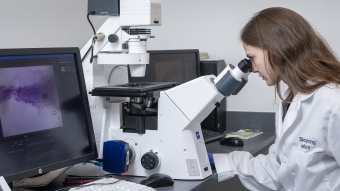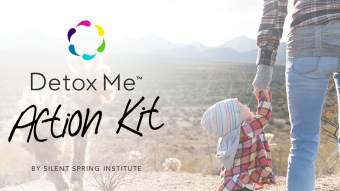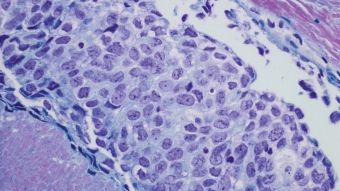Our Impact
Silent Spring’s contribution to breast cancer prevention and environmental health is unparalleled. Since its founding, the Institute has published nearly 200 scientific papers in top journals and its science has informed policies around the country.
First federal limits on PFAS in drinking water protect people nationwide
In April 2024, EPA announced drinking water standards for six PFAS chemicals, marking the first time in more than 20 years the agency has set an enforceable limit on a new unregulated drinking water contaminant. Silent Spring contributed to the new standards through its scientific leadership and community engagement on projects such as the Massachusetts PFAS & Your Health Study, PFAS REACH, STEEP, and the Institute's consumer product studies. The new EPA standards will have significant health benefits, such as lowering rates of cancer and other diseases, and ensuring vulnerable communities, including pregnant and breastfeeding women, as well as infants and children, are protected.
Safer Chemicals Program reveals how chemicals can cause breast cancer
Launched in 2018, Silent Spring’s Safer Chemicals Program is providing regulators and manufacturers with new tools to help quickly identify chemicals that increase breast cancer risk and prevent their use in everyday products. With the publication of several influential studies, our work is expanding the definition of a breast carcinogen to consider the multiple ways chemicals can cause cancer, such as encouraging the body to produce more estrogen. The ultimate goal is to shift the burden so that it’s no longer on consumers to reduce their exposure to toxics, but on companies and regulators to ensure the chemicals that make their way into consumer products are safe.
Clinicians empowered to talk about environmental risk factors
Increasingly, patients want to have conversations with their doctors about environmental risk factors for cancer. However, health care providers are largely unaware of the science. To help clinicians have these conversations, Silent Spring spearheaded several efforts, including the Cancer & Environment Forums, to provide clinicians with the latest information and resources on environmental chemicals and cancer. Clinicians can now integrate that information into their patient care so that reducing exposures to toxic chemicals is discussed alongside other modifiable risk factors such as smoking, diet, alcohol, and exercise.
Massachusetts protects consumers from toxic flame retardants
On January 1, 2021, Massachusetts passed the Children and Firefighters Protection Act into law, which bans 11 toxic flame retardants in children’s products, mattresses, household furniture, carpeting, and window coverings. Silent Spring scientists provided the scientific foundation for the bill, testifying at multiple hearings and meetings with committee chairs.
In 2016, Silent Spring worked with community groups to persuade the City of Boston to change its fire code to allow furniture free of flame retardants in public places. Manufacturers welcomed the changes since adding flame retardants to furniture limits product design, reduces furniture longevity, and adds to production costs. Not only has the change saved institutions hundreds of thousands of dollars, for every college classroom that switches to flame retardant-free furniture, approximately 125,000 students will be spared exposure to harmful chemicals.
Crowdsourced study empowers people to reduce their exposures
At Silent Spring, we believe knowledge is not just power, but a prescription for prevention. In 2016, we launched Detox Me™ Action Kit—the first crowdsourced biomonitoring study on people’s exposure to common household and environmental toxics. The innovative project is part of a national study to assess the U.S. population’s exposure to potentially harmful chemicals found in everyday consumer items, such as personal care products, food packaging, and household cleaners. Thanks to this study, people around the country can find out what’s in their bodies, and become empowered to reduce their exposures and live healthier lives.
Research supports national movement toward safer food packaging
In a 2017 study, we showed that toxic chemicals called PFAS are commonly found in fast food packaging in the U.S. PFAS (per- and polyfluoroalkyl substances) are grease- and waterproof chemicals found in a wide range of consumer products. Their widespread use in food packaging is concerning because PFAS have been linked with cancers, thyroid disease, immune suppression, low birth weight, and decreased fertility. Following the publication of our research, the state of Washington banned PFAS from all paper food packaging, making it the first state in the country to enact such a law. California, Connecticut, Maine, Minnesota, New York, and Vermont have since joined Washington in passing similar bans.
“Right to know” becomes mainstream
Silent Spring has long called for greater sharing of individual results in environmental exposure and biomonitoring studies. Until recently, most researchers have been reluctant to do this for fear it would cause undue harm if the medical implications are unclear. However, the Institute’s pioneering research on the ethics of community-based research has shown just the opposite—reporting back improves science and health literacy, and is an effective tool for translating research into better public health. Today, Silent Spring’s innovative methods for sharing results have become a model for research nationwide.
Consumers can purchase furniture free of toxic flame retardants
Our research on the health risks associated with exposure to toxic flame retardant chemicals inside the home led the state of California to revise its flammability standard for furniture. This new standard, which went into effect in 2014, provides fire safety while eliminating the need for flame retardants in furniture. Because California represents such as large market, this affected products across North America.
In 2017, Silent Spring testified before the U.S. Consumer Product Safety Commission in support of a petition to eliminate an entire class of flame retardants from a range of consumer products, including mattresses. The CPSC voted in favor of the petition. Finally, in 2021, a federal bill was signed into law requiring all upholstered furniture imported or sold in the U.S. to comply with California’s flammability standard for furniture.
Landmark publication on mammary carcinogens shapes national research agenda.
In a landmark study published in 2007 in the journal Cancer, researchers at Silent Spring identified 216 chemicals that cause mammary tumors in animals. The findings were based on an analysis of data from national and international sources. The researchers used the information to create a searchable online database called the Mammary Carcinogens Review Database, featuring detailed information on each carcinogen. The publication of this list—the first of its kind—was foundational. It opened up an entire field of research on the links between environmental chemicals and breast cancer, and helped establish breast cancer prevention as a national research priority.








